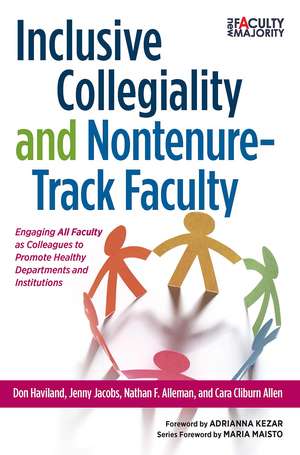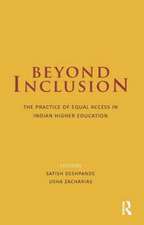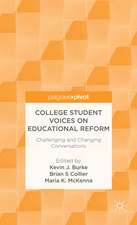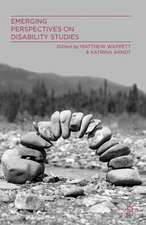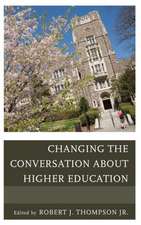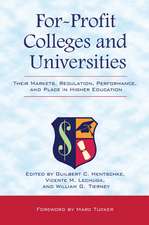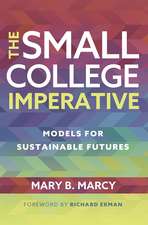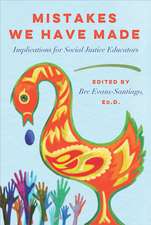Inclusive Collegiality and Nontenure-Track Faculty: Engaging <B>All Faculty</b> as Colleagues to Promote Healthy Departments and Institutions
Autor Don Haviland, Nathan F. Alleman, Cara Cliburn Allen, Jenny Jacobsen Limba Engleză Paperback – 11 mar 2020
| Toate formatele și edițiile | Preț | Express |
|---|---|---|
| Paperback (1) | 253.65 lei 6-8 săpt. | |
| Taylor & Francis – 11 mar 2020 | 253.65 lei 6-8 săpt. | |
| Hardback (1) | 995.70 lei 6-8 săpt. | |
| Taylor & Francis – 13 mar 2020 | 995.70 lei 6-8 săpt. |
Preț: 253.65 lei
Nou
Puncte Express: 380
Preț estimativ în valută:
48.53€ • 50.81$ • 40.16£
48.53€ • 50.81$ • 40.16£
Carte tipărită la comandă
Livrare economică 05-19 aprilie
Preluare comenzi: 021 569.72.76
Specificații
ISBN-13: 9781620366455
ISBN-10: 1620366452
Pagini: 125
Dimensiuni: 152 x 229 x 7 mm
Greutate: 0.2 kg
Ediția:1
Editura: Taylor & Francis
Colecția Routledge
Locul publicării:Oxford, United Kingdom
ISBN-10: 1620366452
Pagini: 125
Dimensiuni: 152 x 229 x 7 mm
Greutate: 0.2 kg
Ediția:1
Editura: Taylor & Francis
Colecția Routledge
Locul publicării:Oxford, United Kingdom
Public țintă
PostgraduateCuprins
Foreword—Adrianna Kezar Series Foreword—Maria Maisto Acknowledgments 1. Introduction 2. Cultivating Interpersonal Trust and Respect 3. Recognizing Professional Expertise 4. Understanding Institutional Context 5. Conclusion References About the Authors Index
Notă biografică
Don Haviland is professor and department chair in the educational leadership department at California State University, Long Beach. Dr. Haviland has over 25 years of experience in academic and student affairs, as well as educational research, and has extensive experience studying the faculty socialization and development process. As senior research associate at WestEd, he was part of a small team that evaluated the Preparing Future Faculty program, designed to prepare graduate students for the full range of faculty careers, for the National Science Foundation and the Annenberg Foundation. In his time at CSULB, he has studied a faculty development program around assessment and the expectations and experiences of full-time contingent faculty related to collegiality. His longitudinal study of 9 pre-tenure faculty through the first 6 years of their careers provides the empirical foundation for the proposed book. Nathan F. Alleman is associate professor in the higher education studies program at Baylor University and a research fellow with the Texas Hunger Initiative. His work focuses on marginal and marginalized populations and institutions. Cara Cliburn Allen is a doctoral candidate in the higher education studies and leadership program at Baylor University. Cliburn Allen studies the success factors of various subpopulations in higher education, including faculty (nontenure-track faculty and faculty denied tenure), underrepresented students (food insecure, community college), and student affairs administrators. Jenny Jacobs is an adjunct professor of theater who has served undergraduate and graduate programs at institutions on the east and west coasts including Temple University, Rider University, Cypress College, and Chapman University. Jacobs’s own research focuses on the value of the performing arts in higher education. Adrianna Kezar is a professor of higher education at the University of Southern California and codirector of the Pullias
Recenzii
From the Foreword:
"This book could not come at a better time. Campuses are recognizing the need to support the growing non-tenure track faculty (NNTF) and to include them in the life of the campus. The notion of collegiality as it relates to NTTF has been rarely considered and certainly not explored in any detail as is done in this valuable text. Collegiality is central to a healthy work environment and particularly significant for professionals whose work is interdependent. The book offers valuable insights into understanding the many ways collegiality is important and provides a helpful definition of this sometimes-elusive concept, often spoken about, commonly misunderstood."
“Given the increased population of Non-Tenure Track Faculty serving at colleges and universities, it is vital that these important members within the academic community are respected, supported, and fully integrated into our departments and institutions. This provocative text is informed by rigorous research which provides clear strategies to create healthy academic environments. Inclusive Collegiality and Non-Tenure Track Faculty is a seminal and compelling resource for scholars and academic leaders seeking to advance these efforts.”
Sydney Freeman, Jr., Associate Professor of Higher Education Leadership and Qualitative Research; Senior Editor-in-Chief, Journal for the Study of Postsecondary and Tertiary Education (JSPTE)
University of Idaho
"Inclusive Collegiality and Non-Tenure Track Faculty is a call to action. Seemingly small acts of kindness and respect contribute to collegial departments, with relationship building central to this work. The authors provide ready-to-implement strategies to recognize the expertise and value that non-tenure track faculty bring to the academy, and highlight the linchpin role of department chairs. Building inclusive collegiality takes work, and this book helps provide a roadmap to reach this goal."
Pamela L. Eddy, Professor, Higher Education, and Department Chair of Educational Policy, Planning & Leadership
College of William and Mary
“A valuable text for academic leaders and faculty which centers the experiences of non-tenure track faculty and is a clarion call for inclusive collegiality. The authors interrogate normative, exclusive notions of collegiality and introduce readers to departments that model cultures that respect, value, and engage non-tenure track faculty as experts. They provide seemingly simple recommendations and tools that, if implemented, can nurture an essential inclusive collegium—their simplicity gives us hope that cultural change is possible, and necessary.”
Jeni Hart, Dean and Vice Provost for Graduate Studies
University of Missouri
“As our government, and particularly our educational systems, explore ways to be more inclusive in our teaching and increase diversity in our ranks, this book explores many aspects of collegiality in higher education. It defines a collegial work environment, what policies and practices create a less-than-inclusive and collegial atmosphere for non-tenure track faculty in our institutions of higher education. Several earlier studies have identified a sense of dissatisfaction among non-tenure-track faculty in interactions with colleagues and a lack of integration and voice in curricular matters in a department, thus leading to a less than optimal collegial working environment.
Haviland and colleagues have provided a much-needed discussion for nontenure-track faculty that readers can extend to their individual circumstances during this unusual time.”
Journal of Faculty Development
"This book could not come at a better time. Campuses are recognizing the need to support the growing non-tenure track faculty (NNTF) and to include them in the life of the campus. The notion of collegiality as it relates to NTTF has been rarely considered and certainly not explored in any detail as is done in this valuable text. Collegiality is central to a healthy work environment and particularly significant for professionals whose work is interdependent. The book offers valuable insights into understanding the many ways collegiality is important and provides a helpful definition of this sometimes-elusive concept, often spoken about, commonly misunderstood."
“Given the increased population of Non-Tenure Track Faculty serving at colleges and universities, it is vital that these important members within the academic community are respected, supported, and fully integrated into our departments and institutions. This provocative text is informed by rigorous research which provides clear strategies to create healthy academic environments. Inclusive Collegiality and Non-Tenure Track Faculty is a seminal and compelling resource for scholars and academic leaders seeking to advance these efforts.”
Sydney Freeman, Jr., Associate Professor of Higher Education Leadership and Qualitative Research; Senior Editor-in-Chief, Journal for the Study of Postsecondary and Tertiary Education (JSPTE)
University of Idaho
"Inclusive Collegiality and Non-Tenure Track Faculty is a call to action. Seemingly small acts of kindness and respect contribute to collegial departments, with relationship building central to this work. The authors provide ready-to-implement strategies to recognize the expertise and value that non-tenure track faculty bring to the academy, and highlight the linchpin role of department chairs. Building inclusive collegiality takes work, and this book helps provide a roadmap to reach this goal."
Pamela L. Eddy, Professor, Higher Education, and Department Chair of Educational Policy, Planning & Leadership
College of William and Mary
“A valuable text for academic leaders and faculty which centers the experiences of non-tenure track faculty and is a clarion call for inclusive collegiality. The authors interrogate normative, exclusive notions of collegiality and introduce readers to departments that model cultures that respect, value, and engage non-tenure track faculty as experts. They provide seemingly simple recommendations and tools that, if implemented, can nurture an essential inclusive collegium—their simplicity gives us hope that cultural change is possible, and necessary.”
Jeni Hart, Dean and Vice Provost for Graduate Studies
University of Missouri
“As our government, and particularly our educational systems, explore ways to be more inclusive in our teaching and increase diversity in our ranks, this book explores many aspects of collegiality in higher education. It defines a collegial work environment, what policies and practices create a less-than-inclusive and collegial atmosphere for non-tenure track faculty in our institutions of higher education. Several earlier studies have identified a sense of dissatisfaction among non-tenure-track faculty in interactions with colleagues and a lack of integration and voice in curricular matters in a department, thus leading to a less than optimal collegial working environment.
Haviland and colleagues have provided a much-needed discussion for nontenure-track faculty that readers can extend to their individual circumstances during this unusual time.”
Journal of Faculty Development
Descriere
This book focuses on the status and work of full-time non-tenure-track faculty (NTTF) whose ranks are increasing as tenure track faculty (TTF) make up a smaller percentage of the professoriate. This book describes lessons learned from and benefits experienced by departments that have successfully supported and engaged NTTF as colleagues.
